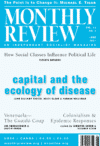Political Economy

In China, the orientation toward “ecological civilization” has been proposed for some years. But if the hard core of developmentalism and modernization continues to be the guiding principle, China will continue to be challenged by social injustice and environmental devastation. | more…

Where capitalism itself is concerned, the dominant view is that the COVID-19 crisis constitutes a rare, unpredictable, and unlikely to be repeated occurrence. The world capitalist economy, we are informed, was fundamentally sound prior to the advent of this unforeseen exogenous shock, and it will revive quickly once the SARS-CoV-2 virus is under control. This received view, however, is incorrect on all counts. | more…

The death of Salvador Allende in 1973 marked, simultaneously, not only the demise of one of the great socialist experiments, and the launching of neoliberalism; it also represented the loss in Allende of one of the great figures in social medicine. Nowhere has neoliberalism had more devastating effects than in the destruction of public health and social medicine initiatives throughout the world. | more…

How Social Class Influences Political Life
In order to understand what is happening in the United States, in the aftermath of the presidential election, one needs to comprehend the distribution of power in the country. | more…
A Sixth, Very Long Coup Attempt
U.S. sanctions killed tens of thousands of Venezuelans before the recognition of Juan Guaidó as interim president in 2019 led to even more murderous sanctions. The message is that tremendous economic pain will be inflicted on the country until Nicolás Maduro is gone. | more…

We can analyze the new Biden administration, its personnel, and the policies it is likely to follow, especially on the all-important questions of the climate crisis and U.S. grand strategy toward China, by looking at the Council on Foreign Relations. | more…

In Socialist Practice, a collection of essays on leftist theory and experiences, Victor Wallis adheres to the view that the achievement of socialism is a drawn out, nonlinear process consisting of episodes that in many cases have a mixed impact on the revolutionary cause. He analyzes several, ranging from the seven decades of Soviet rule to the New Left of the 1960s. His main thesis is that over the last century pure socialism has never existed and that on all fronts socialist movements and governments have contained elements of the old—namely, capitalism. | more…

Those who control the world’s commanding economic heights, buttressed by the theories of mainstream economists, presume that capitalism is a self-contained and self-generating system. Nothing could be further from the truth. In this pathbreaking book—winner of the Paul A. Baran-Paul M. Sweezy Memorial Award—radical political economists Utsa Patnaik and Prabhat Patnaik argue that the accumulation of capital has always required the taking of land, raw materials, and bodies from noncapitalist modes of production. They begin with a thorough debunking of mainstream economics. Then, looking at the history of capitalism, from the beginnings of colonialism half a millennium ago to today’s neoliberal regimes, they discover that, over the long haul, capitalism, in order to exist, must metastasize itself in the practice of imperialism and the immiseration of countless people. | more…
The COVID-19 pandemic has brought into sharp relief the deep structural problems affecting nonwhite racialized workers in the core and periphery. Yet, many social scientific analyses of the global political economy, at least in the pre-COVID era, are race neutral or willfully indifferent to the persistent racial pattern of global inequalities. Even if they do address legacies of colonialism, they ignore the ongoing racial logics of oppression embedded therein. | more…

The Development of Productive Forces in Contemporary Capitalism
Capitalist modernity not only contains profound contradictions, but is also undergoing a significant transformation. Far from acting as a driving force for the development of social productive forces, it has become a parasitic entity with an essentially rentier and speculative function. Underlying this is an institutional framework that favors the private appropriation and the concentration of the products of general intellect. | more…

An Exchange from 2002–03
In December 2002, Isabel Crook, a Canadian anthropologist who had spent most of her life in China and a longtime friend and supporter of Monthly Review, wrote a letter to the MR editors questioning the critical nature of coverage of China’s capitalist road to socialism since the ascendance of Deng Xiaoping in the late 1970s. This short exchange with Harry Magdoff reflects the complex ways in which dedicated socialists sought to address changes in China and the clarity of the ideas expressed. | more…

Although natural constraints on supply are important, most economic scarcities that rule our lives are actually social and artificial. Supply and demand are not natural forces drifting through the air; they are contrived realities established by an interactive social environment involving governments, corporations, institutions, and classes. Supply and demand cycles are social constructs designed to answer a basic question: Who gets what? | more…









